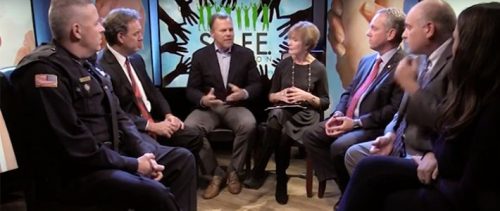Why Opioid Solutions Are Emerging from the Private Sector
By James P. Freeman | October 20, 2017, 6:29 EDT
 A meeting of the SAFE Coalition, which tries to help opioid addicts and families.
A meeting of the SAFE Coalition, which tries to help opioid addicts and families. With swift vivacity and vulgar duplicity, the Massachusetts Legislature — and, as expected, the executive branch — effectively signaled that “bump stock” accessories to rifles, rarely used in crimes, pose a greater threat to Commonwealth residents than fentanyl-laced heroin, killing daily. Demands are made incessantly for so-called “common sense gun control.” But corresponding calls to action for “common sense opioid control” have been largely unanswered, as government has been largely ineffectual. So, action and answers are arriving on the latter front from the private sector, with the likes of S.A.F.E Coalition. And recovery angels.
As creators and custodians of public policy, public officials have, it must be emphasized, resoundingly failed in arresting the opioid crisis here because of a lack of seriousness. Consider:
Last week, with seeming transcendent effort, as New Boston Post reported, the legislature overwhelmingly and uncourageously passed bills to outlaw bump stocks. The state already has the lowest rate of gun deaths in the United States (3.13 per 100,000 residents); there were 135 homicides in Massachusetts in 2016. It is likely in this relatively low homicide environment, nevertheless, that zero deaths occur as a result of bump stocks.
Conversely, Massachusetts has one of the highest rates of death for opioid abuse in the country (30.9 per 100,000 residents); there were 2,107 fatalities attributable to opioid-related-overdose in Massachusetts in 2016, where nearly six people died every day. Opioid deaths are ten times higher than gun deaths here; and opioids kill far more people than guns. Yet efforts to provide consistent funding and full-scale commitment to eradicate the epidemic are regularly stymied. Consequently, public safety remains compromised.
In Massachusetts, where progressive hubris accelerates legislative detritus, it is easier to codify in perpetuity the prospect of life in prison for a highly improbable, nearly nonexistent threat than it is to allocate multi-year appropriations for a clear, present, and continuing danger. This is government by obscenity.
Governor Charlie Baker cut $1.9 million in substance abuse prevention programming in December 2016 as a means to maintain a balanced budget for fiscal year 2017. But he touted increases in key funding to address opioid addiction for the current fiscal budget. State Representatives Randy Hunt (R-Sandwich) and Diana DiZoglio (D-Methuen), among the courageous few, were rejected in their efforts to seek a dedicated funding stream from the state’s Marijuana Regulation Fund for substance-use education, prevention, and treatment. But the fiscal year 2018 state budget includes $2 million for start-up costs for the newly minted Cannabis Control Commission, created to regulate recreational marijuana. (The legalization of another controlled substance amid a controlled substance emergency is both lurid and ludicrous.) More dollars for fun, fewer for death-prevention. Not many question such obvious misplaced prioritization. But someone does.
Enter Jim Derick.
He is president and a founder of S.A.F.E. — Support for Addicts and Families through Empowerment — a coalition of volunteers which provides support, education, treatment options, and coping mechanisms for those affected by substance abuse disorder. While erasing the social stigma placed on addicts is important, reducing the barriers to treatment is paramount.
SAFE was formed in 2015 under the leadership of state Representative Jeffrey Roy (D-Franklin), Franklin Town Councilor Bob Delorco, and former Franklin resident and Franklin High School graduate Jennifer Knight. They were frustrated by what Derick calls the “rapid escalation” of the carnage of opioids affecting Franklin and its neighboring communities in Norfolk County. No one was taking about it, he recalled. And there was little evidence of progress in arresting the scourge. As he says, with justifiable exasperation, “The U.S. consumes 85 percent of all opioid pain pills. Are we in more pain than the rest of the world?”
Believing that public policy is actually “driving this epidemic,” especially on a federal level (see the recent damning 60 Minutes segment on opioids), Derick is also dismayed by the ebb and flow of state funding to groups like SAFE (it received a state grant of $50,000 in 2015, for which Derick is grateful, but none in 2016). And don’t get him started on the lack of “insurance parity,” where families are too often denied life-saving coverage. So, he is channeling his frustrations as a megaphone of local advocacy. He rightly believes that private sector solutions, coupled with dedicated public contributions, are the best means to success.
Defining success is simple: zero overdoses and zero deaths. Achieving success is far more challenging: preventing overdoses and saving lives. SAFE does it one life at a time.
SAFE began offering a resource line and community outreach in 2016. Since then, its volunteers (some of whom weekly give 25-40 hours of their time) have engaged over 300 people. Last week seven families reached out for assistance. The resource line gets calls ranging from addicts looking for detox and treatment options, to a parent/spouse/loved one requesting information on Section 35 (the civil process to effect involuntary commitment), to, sadly, families seeking bereavement services.
“At any given moment, I’d say we are actively working with 20 to 25 people,” Derick says. The coalition is “absolutely stretched extremely thin” as call volume is increasing monthly as overdoses are rising precipitously. But the coalition is motivated by these grim statistics: In 2000, Norfolk County reported just 29 opioid-related overdose deaths; by 2016, that number rose to 205 deaths.
SAFE maintains no offices. Instead, meetings are held at local businesses and forums at schools. Much of its work is modelled after the Plymouth County Outreach (it serves and links 27 towns and is pioneering data-driven recovery methodology). As an incubator of ideas, SAFE brings together diverse stakeholders, mindful of avoiding “silo thinking.” They include elected officials, school members, clergy, mental health experts, police and other first responders, and recovery angels.
Increasingly, to positive effect, recovering addicts are acting as so-called recovery angels, meaning they are trained for intervening and mentoring during post-opioid episodes. The advent of trained angels and recovery coaches is a welcome development in the opioid battle. Ideally, this new form of intervention will lead to successful rehabilitation. Both are seen as more efficacious alternatives to incarceration, as prison has proven to be expensive and ineffective regarding substance abuse disorder. Time should tell.
Derick’s anger melts into animation when talking about the organic and myriad initiatives being tested and adopted throughout the Commonwealth. He praises fellow advocates who travel the state, searching for creative ideas and better solutions. He is excited by PAARI (Police Assisted Addiction and Recovery Initiative), originally begun as the “Gloucester Initiative,” and funded by philanthropists. And he is encouraged by a new creation, Private Sector Cares. It aims to assemble a board of prominent business leaders throughout the commonwealth to “collaborate and help fund some of the coalition’s initiatives across the commonwealth.”
Inadequate and inconsistent funding is an impediment to progress, warns Derick.
Understandably, there are costs. “As we have grown and become known as a resource, we have been asked to assist towns, many outside our county, with some of our services.” Fund raising competes with, but is a necessary bi-product of, providing critical services. Seeking state grants is a gargantuan effort: paperwork, red tape, narrow line items. It’s a process that, Derick says, “we literally have to rely on a hundred hours of accounting time to get it.” That’s less time for emergencies.
What can Massachusetts do?
The legislature can redeem itself from desultory distractions by streamlining this process and increasing funding to these grass-roots groups. Funding should include dedicated, multi-year allocations, based on need. SAFE serves a population of well over 100,000, but currently is only granted $100,000.
It is altogether fitting that Derick provided his thoughts for this column on October 13. That date marked the centennial commemoration in the Catholic Church of the last Fatima Apparitions, where believers witnessed the Miracle of the Sun. One has to believe that, given their unsung and yeomen work, Derick, the volunteers at SAFE, and similar organizations across the state, are producing miracles every day. The opioid epidemic is among the sorrowful mysteries of this troubled age.
James P. Freeman is a New England-based writer and former columnist with The Cape Cod Times. His work has also appeared in The Providence Journal, newenglanddiary.com and nationalreview.com.











